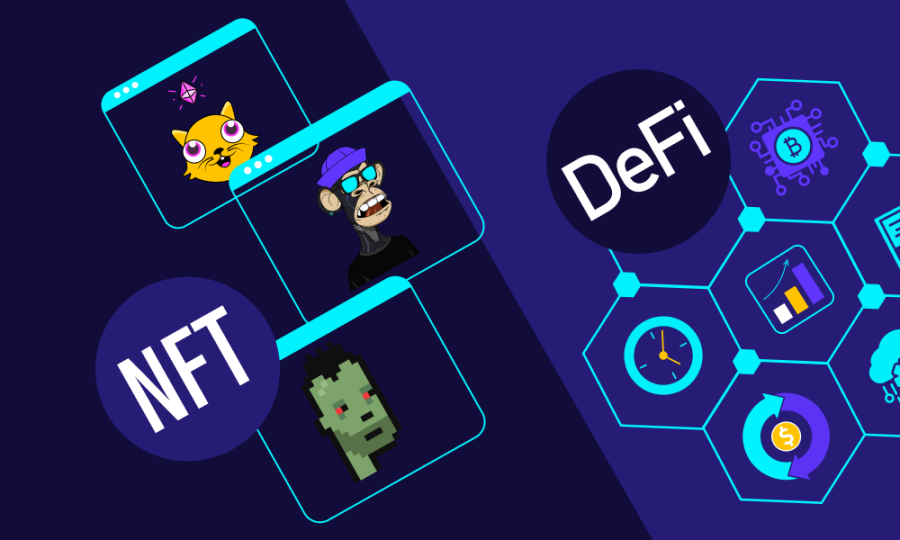In recent years, the world of finance has been undergoing a revolution with the rise of decentralized finance (DeFi) and non-fungible tokens (NFTs). DeFi is a financial application system operating on a decentralized, blockchain-based network. NFTs, on the other hand, are unique digital assets that are also recorded on the blockchain. This article will explore the intersection of DeFi and NFTs and their impact on the financial industry.
What are Non-Fungible Tokens (NFTs)?
To understand NFTs, it is essential first to define fungibility. In finance, fungibility refers to the ability of an asset to be exchanged for another asset of the same value. For example, a $10 bill is fungible because it can be exchanged for another $10 bill of the same value. In contrast, a unique painting by a famous artist is non-fungible because it cannot be exchanged for an identical item of the same value.
NFTs are digital assets that are unique and non-fungible, just like a one-of-a-kind painting. They can represent any type of digital content, such as art, music, videos, and even tweets. NFTs are created using blockchain technology, which allows for a transparent and secure record of ownership and provenance.
NFTs have gained popularity in recent years, particularly in the art world. In March 2021, a digital artwork by Beeple sold for a record-breaking $69 million at a Christie’s auction. The artwork, which was an NFT, is a unique digital file that includes 5,000 individual images created by Beeple over 13 years.
What is DeFi?
Decentralized finance, or DeFi, is a new financial application system operating on a decentralized, blockchain-based network. The goal of DeFi is to create a more open and accessible financial system that is not controlled by a centralized authority. DeFi applications use smart contracts to automate financial transactions and eliminate the need for intermediaries such as banks.
DeFi has grown rapidly in recent years, with the total value locked in DeFi protocols surpassing $100 billion in 2021. The most popular DeFi applications include decentralized exchanges (DEXs), lending protocols, and stablecoins.
DeFi and NFTs: The Intersection
While DeFi and NFTs are two distinct innovations but also closely related. The blockchain technology that underpins both DeFi and NFTs allows for a transparent and secure record of ownership and transactions.
One way in which DeFi and NFTs intersect is through the use of NFTs as collateral for loans. In traditional finance, collateral is an asset that is pledged as security for a loan. In DeFi, users can use their NFTs as collateral to borrow stablecoins or other cryptocurrencies. This is possible because the blockchain allows for a transparent and secure record of ownership and provenance of the NFT.
Another way in which DeFi and NFTs intersect is through the creation of NFT-based financial products. For example, a DeFi protocol could create a token representing ownership of a portfolio of NFTs. Investors could then buy and sell these tokens on a decentralized exchange, providing liquidity to the market for NFTs.
Using NFTs in DeFi also opens up new possibilities for fractional ownership of digital assets. Fractional ownership allows investors to own a percentage of an asset, which can be beneficial for assets that are too expensive for one person to purchase outright. For example, an expensive piece of digital art could be divided into fractional ownership tokens, which could then be traded on a decentralized exchange.
The Impact of DeFi and NFTs on the Financial Industry
The impact of DeFi and NFTs on the financial industry is significant and far-reaching. These technologies can potentially disrupt traditional financial systems by making them more transparent, accessible, and efficient. With DeFi, users can access financial services such as lending, borrowing, and trading without the need for intermediaries like banks. NFTs have enabled the creation of unique digital assets that can be used in various DeFi applications, such as collateral for loans and fractional ownership of digital assets. This has opened up new investment opportunities and revenue streams for individuals and businesses. Additionally, using smart contracts on blockchain technology has increased the security and transparency of financial transactions, reducing the risk of fraud and corruption. DeFi and NFTs are transforming the financial industry and creating new possibilities for using digital assets.
The Future of DeFi and NFTs
The future of DeFi and NFTs is exciting and full of potential. As these technologies continue to mature and gain wider adoption, we can expect to see new use cases and applications emerge. DeFi protocols are becoming more user-friendly, with improved interfaces and reduced gas fees, making them more accessible to mainstream users. This will likely increase adoption and usage, leading to diverse financial products and services. NFTs are also likely to become more prevalent, with increased use cases beyond art and collectables. For instance, NFTs could be used to represent real-world assets such as real estate or stocks, enabling easier and more efficient trading and ownership. Overall, the future of DeFi and NFTs is bright, and we can expect to see these technologies play an increasingly important role in the financial industry in the years to come.
Conclusion
In conclusion, the intersection of DeFi and NFTs creates new opportunities for the financial industry to become more transparent, accessible, and efficient. Non-fungible tokens have enabled the creation of unique digital assets that can be used in various DeFi applications, such as collateral for loans, NFT-based financial products, and fractional ownership of digital assets. While there are still challenges and risks associated with DeFi and NFTs, such as high gas fees and the potential for scams and fraud, these technologies have the potential to transform the financial industry in profound ways. As DeFi and NFTs continue to evolve and mature, it is essential for users to exercise caution and do their own research to navigate this exciting and innovative space.




